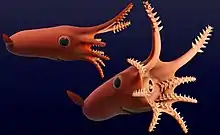Vampyronassa
Vampyronassa rhodanica ("vampire fish trap") is an extinct vampyromorph cephalopod known from around 20 fossils from the Lower Callovian (165–164 Ma) of La Voulte-sur-Rhône, Ardèche, France.[1]
| Vampyronassa Temporal range: Middle Jurassic | |
|---|---|
 | |
| Pyritized fossil of Vampyronassa rhodanica from Voulte-sur-Rhône, France. | |
| Scientific classification | |
| Domain: | Eukaryota |
| Kingdom: | Animalia |
| Phylum: | Mollusca |
| Class: | Cephalopoda |
| Order: | Vampyromorphida |
| Family: | Vampyroteuthidae |
| Genus: | †Vampyronassa Fischer & Riou, 2002 |
| Species: | †V. rhodanica |
| Binomial name | |
| †Vampyronassa rhodanica Fischer & Riou, 2002 | |
Morphology
.jpg.webp)
Vampyronassa reached total length about 10 cm (3.9 in).[2] This taxon differs from the modern vampire squid in having longer first dorsal arms, a larger hyponome, and a more elongated mantle. Original description described possible luminous organs,[1] however in restudy they could not be confirmed.[2] It had eight arms with uniserial suckers flanked by cirri, same as modern vampire squid. Retractile filaments that is known from modern vampire squid is not known in Vampyronassa.[2] Like vampire squid, Vampyronassa lacked of ink sac.[2]
Classification
Vampyronassa shares some characters with modern vampire squid Vampyroteuthis, such as lack of ink sac and unique type of sucker attachment.[2] Analysis supports the sister relationship between Vampyronassa and Vampyroteuthis.[2]
Palaeoecology

Although modern vampire squid is deep-sea opportunistic detritivore and zooplanktivore, Vampyronassa is estimated to be an active predator following a pelagic mode of life according to characters of its arms.[2] Considering Oligocene vampyromorph Necroteuthis probably had deep-sea mode of life,[3] initial shift of vampiromorphs to offshore environments was possibly driven by onshore competition.[2]
References
- Fischer, Jean-Claude; Riou, Bernard (2002-01-01). "Vampyronassa rhodanica nov. gen. nov sp., vampyromorphe (Cephalopoda, Coleoidea) du Callovien inférieur de la Voulte-sur-Rhône (Ardèche, France)". Annales de Paléontologie (in French). 88 (1): 1–17. doi:10.1016/S0753-3969(02)01037-6. ISSN 0753-3969.
- Rowe, Alison J.; Kruta, Isabelle; Landman, Neil H.; Villier, Loïc; Fernandez, Vincent; Rouget, Isabelle (2022-06-23). "Exceptional soft-tissue preservation of Jurassic Vampyronassa rhodanica provides new insights on the evolution and palaeoecology of vampyroteuthids". Scientific Reports. 12 (1): 8292. doi:10.1038/s41598-022-12269-3. ISSN 2045-2322. PMC 9225997. PMID 35739131.
- Košťák, Martin; Schlögl, Ján; Fuchs, Dirk; Holcová, Katarína; Hudáčková, Natalia; Culka, Adam; Fözy, István; Tomašových, Adam; Milovský, Rastislav; Šurka, Juraj; Mazuch, Martin (2021-02-18). "Fossil evidence for vampire squid inhabiting oxygen-depleted ocean zones since at least the Oligocene". Communications Biology. 4 (1): 216. doi:10.1038/s42003-021-01714-0. ISSN 2399-3642. PMC 7893013. PMID 33603225.